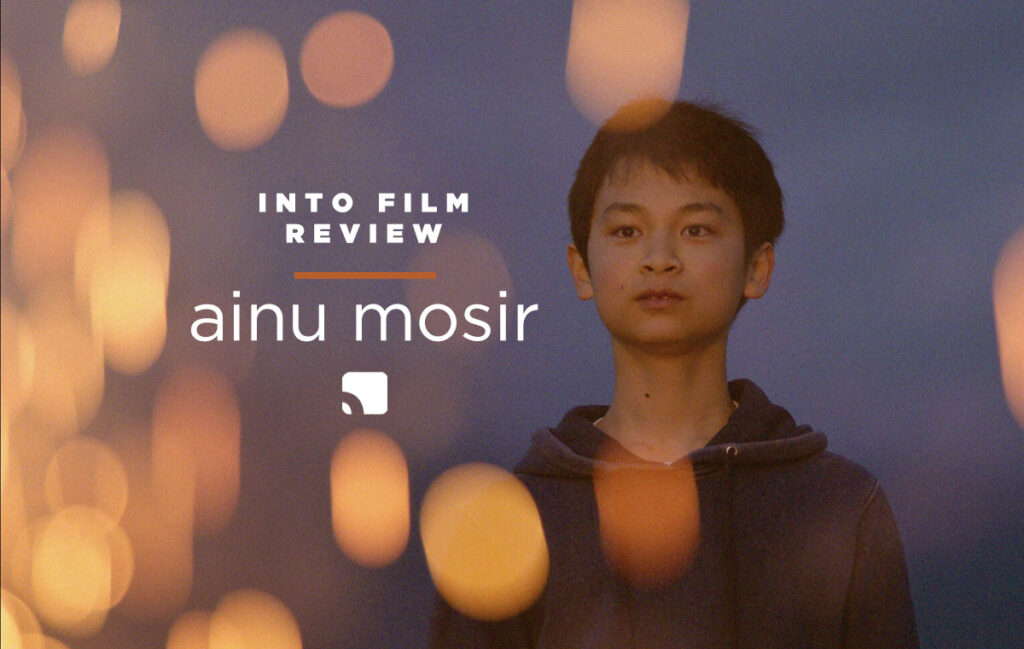Into Film: Ainu Mosir

Film Title: Ainu Mosir
Director: Takeshi Fukunaga
Limited Theatre Release (2020). Streaming: Netflix (2020)
Production Company: Cineric Creative
Watching Ainu Mosir is a bit like contemplating snowflakes fall in the night from behind the comfort of a warm pane: it drifts before you in gentle flakes that melt in a moment yet leave an impression so deep that you know you have witnessed something magical. However, just as snow falls heavier and becomes a swirling mass, so this film gathers momentum and not only does a drama unfold, but with it a lost culture and a way of life that has evaporated like crystal droplets on a forest floor.
The story is set in the context of the Ainu people; the indigenous folk of Northern Japan. In essence, it is a Bildungsroman, a young boy’s coming of age as he copes with the death of his father, discovering his own roots and a cycle of spiritual rebirth. Acted mostly by members of the Ainu community and filmed on location in Hokkaido, this is the sensitive portrayal of 14-year-old Kanto, (played by Kanto Shimakura) and his struggle to come to terms with the fact that his world has been rocked to its volcanic core.
The film, written and directed by Takeshi Fukunaga, (Out of My Hand; 2015) himself an Ainu, living in New York, works on a level beyond the pragmatic portrayal of forgotten cultures so often seen in dry documentaries of the past, or feeble Hollywood movies with the token Native American actor thrown in to add authenticity. In Japanese, with no subtitles, the English-speaking viewer has to rely on contextual clues, seasonal changes and emotional musical presentations, which transcend dialogue, to follow the plot. The performance by the community, depicting life in a fictitious tourist village, is a realistic mix of resilience and defiance. The Ainu pride in language and culture shines through and is much more profound than what the tacky souvenir shops and tourist entertainment might suggest. Traditional costume, crafts, music and dance, demonstrating a collective resistance to the 19th century Japanese Assimilation Policies while embracing The UN Declaration of the Rights of Indigenous Peoples, (2007), are brought to the screen in a colourful array of exotica that adds spirit to the day to day drudgery, despite the Ainu’s struggle to be accepted as equals in 21st century Japan. The young are bored with the clichés of the old and Kanto prefers performing an energetic rendition of ‘Johnny B Goode’ on his electric guitar, to playing the gentle folk music of his people, but after the trauma of his father’s death, he feels the spiritual lure of a crevice in the mountains, which takes him on a new journey.
Kanto is taken under the wing of village elder and family friend, Debo, (Debo Akibe) who begins to teach him traditional hunting, fishing and woodcraft skills. Debo also mentors the teenager in Ainu beliefs and their connection with the spirits of nature and the animal gods. Debo takes Kanto into the forest to show him a bear cub, kept in captivity but he neglects to reveal the animal’s horrific fate. Kanto begins to tend to and connect with the little beast but his friendship with Devo takes a terrible twist after he discovers the truth about its future.
The moods of this film are quietly transmitted by the direction of Fukunaga and his close up shots of the faces of people and the eyes of a bear. The dialogue is brief, the island scenery spectacular and the cinematography so beautiful, it is as though we have been transported into a silent silk screen, painted by a Zen master in subtle shades of Chinese ink. This is an artful and meditative film, about human and animal rights, relationships, spirituality, identity and loss, sensitively depicted through the perspective of a boy who demands more from his elders than they can perhaps give. For me, it was well worth the challenge of navigating the plot through a foreign language to come out at the other end, feeling somewhat changed.
L M Mulholland

Footnote: ‘Ainu‘ means human and ‘mosir‘ or ‘moshir‘ means place or settlement.
If you like this review, please share on your social media channels. Thank you.
